
Breadcrumbs navigation
The latest in IR - winter book round up
Welcome to our quarterly book round up. Each quarter we bring you updates on the latest International Studies releases by BISA members. To be included in the next update contact Communications Manager, Chrissie Duxson: Chrissie.Duxson@bisa.ac.uk
Assisting International Justice
Cooperation Between UN Peace Operations and the International Criminal Court in the Democratic Republic of Congo
Tom Buitelaar
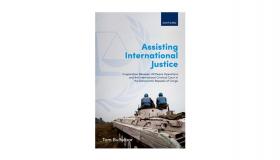
Tom Buitelaar is an Assistant Professor in the War, Peace and Justice programme of the Institute of Security and Global Affairs at Leiden University. He studies and teaches on the role of international conflict interventions in world politics, with specific attention on how interveners balance peace and justice, and is also interested in how international norms guide these interventions and the role of individual agency in enhancing their effectiveness.
Blurb
Although the International Criminal Court (ICC) - as the only permanent international court that addresses crimes against humanity, genocide, and war crimes - has important potential to end impunity and find justice for victims of atrocities, it is dependent on others for almost all aspects of its functioning. The Court has frequently relied on the peacekeeping operations that the UN deploys in the field and, over the past two decades, UN peacekeepers have provided logistical assistance and security to Court investigators, shared large amounts of information, and have even been involved in the arrest of Court suspects. But their track record has been inconsistent: they have sometimes refused to take action against people accused of war crimes and have found it difficult to balance their impartiality with court prosecutions. Despite the empirical importance of this phenomenon, we know preciously little about the circumstances under which it occurs.
In Assisting International Justice, Buitelaar reveals the conditions under which UN peacekeepers address impunity in their mission areas. He presents an original single-country case study of assistance provided by the UN mission in the Democratic Republic of the Congo and a plausibility probe of other peace operations in ICC situation countries. Relying on new empirical material, including over 130 interviews of key decision-makers, and comprehensive archival research, this scholarly volume explores how the UN navigates the terrain of conflict mediation and punitive accountability and demonstrates the collaborative but contingent relationship between the UN and the ICC.
Find out more and purchase the book via the Oxford University Press website. Receive 30% off using the code ASFLYQ6.
Ukraine
Russia’s War and the Future of the Global Order
Michael Cox (ed.)
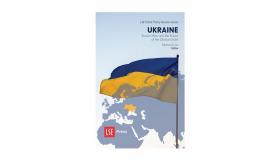
Michael Cox is a Founding Director of LSE IDEAS and Emeritus Professor in International Relations at LSE. He was appointed to a Chair in International Relations at the School in 2002. He is currently completing a volume for Polity Books called Comrades: Xi Jinping, Putin and the Challenge to Western Liberal Order.
Blurb
The full-scale invasion of Ukraine by Russia in 2022 has not only caused immense suffering inside the country, and among its people, it has shifted the political landscape in Russia for the worse, altered the strategic map of Europe, and created division and economic pain in the rest of the world.
In this volume, a group of internationally acclaimed academics – many originally from Ukraine or Russia – examine the deep causes of Putin’s war, the role played by other actors such as China and the United States, the severe consequences for the many millions of Ukrainians displaced from their home and country, the impact on the West and the Global South and the challenges confronting Ukraine when the war finally comes to an end.
This book is free to read online or download from the LSE Press website. You can also find links there to purchase a paperback copy if you prefer.
Politics of Hybrid Warfare
The Remaking of Security in Czechia after 2014
Jakub Eberle and Jan Daniel
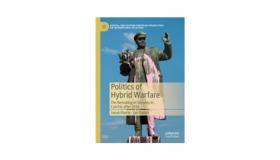
Jakub Eberle is Research Director and Senior Researcher at the Institute of International Relations Prague. He works on IR theory, Czech and German foreign policy, and politics of Central Europe. He is the author of Discourse and Affect in Foreign Policy: Germany and the Iraq War (2019).
Blurb
This is a first book-long analysis showing how the notion of ‘hybrid warfare’ was used to transform security policies and discourses in an EU/NATO country. Building on current debates in International Political Sociology, Critical Security Studies, and Critical Geopolitics, it provides a novel account of how crisis, geopolitics, uncertainty, and expertise are intertwined in the social construction of threats. Based on extensive and original empirical research of large textual archive and elite interviews in the Czech Republic and Brussels, the book shows how officials, bureaucrats, journalists, activists, and experts all participate in the reshaping of security in a new geopolitical environment. Zooming on the case of Czechia and its specific Central European context, it complements the predominantly Western-centric studies of insecurity with an account of how the liminal position on an East/West boundary influences security politics. As a first study of its kind and scope, it will be of interest to academics and students interested in Central European politics, practices and discourses of hybrid warfare, as well as critical approaches to security and geopolitics.
Find out more and purchase the book via the Springer website.
Inside the UN Security Council
Legitimation Practices and Darfur
Jess Gifkins
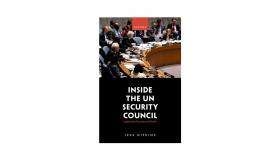
Jess Gifkins is a Senior Lecturer in International Relations at the University of Technology Sydney. Her research is on the United Nations and the Responsibility to Protect, with projects on practices, the UK at the UN, queering atrocity prevention, and early warning of atrocity crimes.
Blurb
UN Security Council decisions impact billions of people and yet its formal rules are minimal and tell us little about how decisions are made. Instead, informal, and often unwritten practices, form the basis of negotiations. Inside the UN Security Council analyses informal practices within Security Council decision-making, both in general and focused on the case of Darfur in the west of Sudan, to pull back the curtain on decision-making. Security Council negotiations on Darfur are analyzed in depth across issue areas of agenda-setting, sanctions, referral to the International Criminal Court, and peacekeeping.
One way of understanding these informal practices is via the lens of legitimation. This is a useful approach because it brings to the fore the ways in which states seek legitimacy for themselves, and for Security Council decisions, as part of the negotiation process. Inside the UN Security Council introduces and develops the concept of legitimation practices to analyse the UN Security Council's decision-making. Legitimation practices shape the process and outcome of negotiations in two different ways. Internal legitimation practices, which relate to the legitimation of Security Council decisions, such as prioritizing unanimity, constrain and enable the text of resolutions. External legitimation practices such as 'doing something', even when it is known that it cannot be implemented, relate to the legitimation of actors in the negotiations and shape whether decisions can be reached at all. Foregrounding legitimation practices sheds light on seemingly contradictory moments within Security Council decision-making, such as the United States enabling the referral of the situation in Darfur to the International Criminal Court, despite its longstanding objections to the court and the capacity to veto the decision. The book draws on a wide range of primary and secondary sources, including original interviews with key decision-makers, to show that legitimation practices are an integral aspect of Security Council negotiations.
Find out more and purchase the book via the Oxford University Press website. Receive 30% off using the code ASFLYQ6.
Reconciliation by Stealth
How People Talk about War Crimes
Denisa Kostovicova
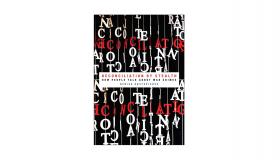
Denisa Kostovicova is Associate Professor of Global Politics in the European Institute at the London School of Economics and Political Science. She is a former convenor of the BISA South East Europe Working Group. She presented the papers from the book whilst writing it at the BISA conferences held at Edinburgh, London, and Brighton.
Blurb
Reconciliation by Stealth advances a novel approach to evaluating the effects of transitional justice in postconflict societies. Through her examination of the Balkan conflicts, Denisa Kostovicova asks what happens when former adversaries discuss legacies of violence and atrocity, and whether it is possible to do so without further deepening animosities. Reconciliation by Stealth shifts our attention from what people say about war crimes, to how they deliberate past wrongs.
Bringing together theories of democratic deliberation and peacebuilding, Kostovicova demonstrates how people from opposing ethnic groups reconcile through reasoned, respectful, and empathetic deliberation about a difficult legacy. She finds that expression of ethnic difference plays a role in good-quality deliberation across ethnic lines, while revealed intraethnic divisions help deliberators expand moral horizons previously narrowed by conflict. In the process, people forge bonds of solidarity and offset divisive identity politics that bears upon their deliberations.
Reconciliation by Stealth shows us the importance of theoretical and methodological innovation in capturing how transitional justice can promote reconciliation, and points to the untapped potential of deliberative problem-solving to repair relationships fractured by conflict.
Find out more and purchase the book via the Cornell University Press website.
North American Regionalism
Stagnation, Decline, or Renewal?
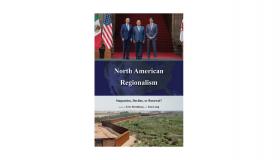
Tom Long is a reader of international relations at the University of Warwick and an affiliated professor at CIDE-Mexico City. Eric Hershberg is a professor of government at American University, where he served as the founding director of the Center for Latin American and Latino Studies from 2010 to 2022.
Blurb
North American Regionalism problematizes "North America" as an important region in its own right, breaking with the area-studies convention that divides the Global North and Global South portions of the Western Hemisphere at the US-Mexican border. By cutting across this division, the theoretically sophisticated essays in this volume yield new insights about politics, society, and the economy of North America, opening dialogues with the New Regionalism approach and the literature on comparative regional studies.
Drawing on a six-year interdisciplinary collaboration among leading scholars from Canadian, Mexican, US, and European universities, the book brings North America back into International Relations' study of regions and regionalism. The book includes robust theoretical and empirical engagement with issues of trade, migration, security, energy and climate, and the rise of China.
Find out more and purchase the book through the University of New Mexico Press.
Shaping Peacebuilding in Colombia
International Frames and Spatial Transformation
Catalina Montoya Londoño
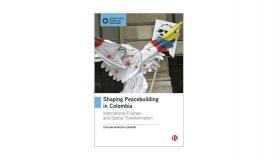
Catalina Montoya is Associate Professor in International Relations and Director of the MA in Politics and International Relations at the Archbishop Desmond Tutu Centre for War and Peace Studies at Liverpool Hope University.
Blurb
During the second half of the 20th century, Colombia suffered extreme levels of political violence. This book explores the involvement of the international community in peacebuilding efforts in Colombia since 2016. In particular, it examines how interventions were framed in order to promote and sustain their involvement and questions whether these frames reflected reality within Colombia.
The book focuses on key donors, including the US, the EU, Canada, Sweden and the UK, as well as multinational actors, such as the UN and the World Bank, to demonstrate how their framing of local issues for national and international consumption can have real world implications for peacebuilding efforts on the ground.
Find out more and purchase the book through Bristol University Press.
Precision
A history of American warfare
James Patton Rogers
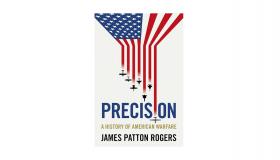
James Patton Rogers is the Executive Director of the Cornell Brooks Tech Policy Institute at Cornell University. He has been an expert advisor to the United Nations Security Council, UK Parliament and is the NATO Country Director of the Full Spectrum Drone Warfare project supported by NATO SPS.
Blurb
We think of precision warfare as a modern invention, closely associated with the Gulf War, the Kosovo Campaign and drone technologies. But its origins go back much further in history.
As historian James Patton Rogers reveals, this quest to achieve precision in war began in 1917, during the early years of powered flight in the United States. This means that precision has been a significant, if not always achievable, feature of American strategic thought for more than a hundred years.
Patton Rogers takes readers on a journey through the twentieth century, highlighting the innovative thinkers of the First World War, the experimental technologies of the Second World War and the surprising Cold War nuclear strategies that made precision the dominant feature it is today. From Russia's offensive war in Ukraine to Libya, Ethiopia and Nagorno-Karabakh, the conflicts of the twenty-first-century are being fought with precision weapons. Patton Rogers answers two enduring questions: why has precision been such a defining feature of US military thinking? And how has this ambition shaped public and military perceptions of war today?
Find out more and purchase the book through Manchester University Press.
If you're a BISA member and you'd like your book included in next quarter's round up, email Communications Manager, Chrissie Duxson: Chrissie.Duxson@bisa.ac.uk. Please include the title, blurb and a link to where the book can be purchased. If you are able, you can also include details of any discount available, but of course this is not required. The book should have been published a maximum of six months prior to your email.
Top photo by Phil Hearing on Unsplash